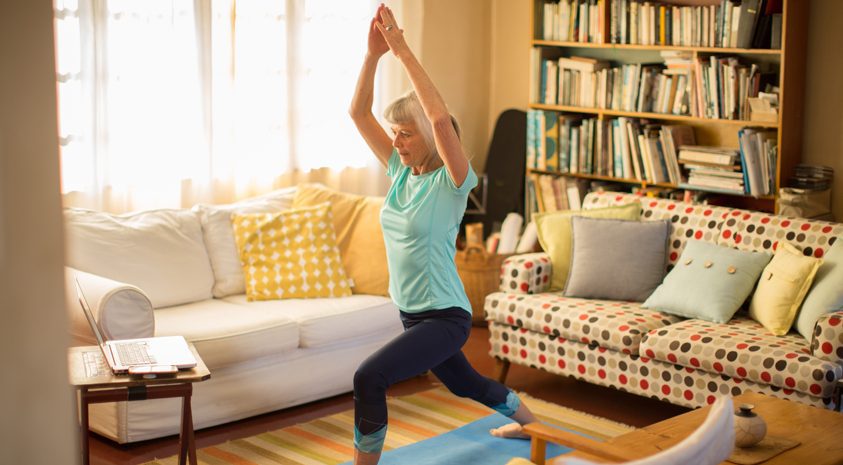When people started getting sick from the new COVID-19 strain of coronavirus last year, doctors still had a lot to learn about how it would affect us. And while there’s still a ton to learn, the Centers for Disease Control found that people with existing health issues are more at risk. Whether this has been the reason you were looking for to make some healthier changes to your lifestyle, or you’re just thinking about your future, read on to see how easy it can be to make a few changes and start living healthier.
Preventing Illness From The Start
You remember the old adage, right? An ounce of prevention is worth a pound of cure. Well, as we get older, that becomes even more important. It’s easier to treat conditions early, or stop yourself from getting sick in the first place, than to deal with them when they’ve become a serious issue.
Preventative care qualifies for Medicare coverage. This means routine screenings for colon cancer, heart problems, cholesterol and more. You should make sure you’re going to your doctor regularly. During 2020, early in the pandemic, heart-related deaths saw a large increase.1 Health experts say this is because people were avoiding care due to virus fears. But hospitals and doctors’ offices have taken incredible precautions to keep patients safe. And now, with telehealth, you can even talk to your doctor on the phone or computer.
Vaccinations are a great preventative measure that can keep you from even getting sick in the first place. There’s been a lot of talk around vaccinations recently, because of the race to develop a successful vaccine to prevent COVID-19. But it’s just as important to keep up with your other vaccinations as well! While anyone can get the flu, it can be more difficult to get over as we get older. Being less active could mean it’s tougher to clear the lungs, leading to infections like pneumonia. According to the American Academy of Family Physicians (AAFP), the death rate among elderly adults with severe pneumonia is as high as 20%.2 So you can see why preventative care and vaccinations are so important!
Eating Healthier
Maintaining a healthy weight is important all through life, but it can become even more so the older we get. And that doesn’t just mean keeping the pounds off. In some cases, it may mean putting them on!
Obesity is a problem affecting over 28% of those 65 and older, and is increasing every year.3 Obesity is a major cause of diabetes, hypertension, and heart disease. It also affects our ability to breathe, reducing our lung capacity. Luckily, those risks go down as you get closer to a healthier weight. Eating lean proteins like chicken or turkey, and high fiber foods like leafy greens can help you keep a well-balanced diet. Remember, as we get older, we often need fewer calories. Reducing the amount you eat could help lose weight.
Of course, there are many older adults who end up with the opposite problem—not eating enough. Some medications can affect appetite, and sometimes we simply lose our appetites with age. That’s why it’s important to pay attention to what you’re eating, and try to balance your meals with fruits and vegetables for fiber, and lean proteins and grains for calories.
Here’s an easy way to think about it: malnutrition puts you at risk of becoming overweight—or underweight. Both can weaken your muscles and bones and put you at risk for disease. So look into maintaining a simple healthy eating plan, like this one from the National Heart, Lung, and Blood Institute.
Staying Active
As people get older, they tend to become less active. But that can look different for everyone. Luckily, there are recommendations for staying active and healthy. And the first is to just get moving!
It’s recommended that you get at least 30 minutes of moderate aerobic activity every day. This means an activity that gets your heart pumping a bit harder than it normally is. You won’t need to sign up for a marathon or anything, but it’s a good idea to try walking a bit faster than you normally would. You should also try some strength exercises once a week to keep your muscles strong.
But one of the most important types of exercises to do as you get older is a “weight-bearing exercise”. This doesn’t mean lifting heavy weights. This means doing exercise that involves you bearing the weight of your body, working against gravity. Walking and jogging are both weight-bearing exercises. So are some fun activities you’re already enjoying, like playing tennis or doing tai-chi.
By staying active every day, and using weight-bearing exercises like walking or stair-climbing, you’ll have an impact on your bone health. Evidence suggests that an exercise regimen that includes moderate activity and moderate impact may be the optimal way to enhance bone structure and strength.4
Paying Attention to Mental Health
Great news: when you are eating healthy and staying active, your mental health tends to improve! So by making some easy adjustments to your life, you’re already watching out for your mental health (and preventing things like depression from creeping in). But as we age, we go through some new life stressors that can affect our mental health, so it’s important to pay close attention to how you’re feeling.
One of the most common mental health concerns in older adults is depression. It can actually increase a person’s own poor perception of their health, and even cause people to not seek out care or treatment for other illnesses. While depression is a common problem, it’s not a normal part of aging! In fact, studies show the older we get, the more content we are with our lives. So, if life changes are causing uneasiness or stress, it’s important to reach out to someone. Medications and therapy can both help, and there are lots of resources for counseling services.
Learn more about the importance of mental health from the National Institute on Aging, or find resources through Medicare (many of which may be covered).
Wrap Up
No matter where you are on your health journey, it never hurts to reassess and make sure you’re living a healthy life! From preventing illnesses with vaccines and regular checkups, to eating and exercising well, to checking in on your own mental health, you can do a lot of good for yourself with just a few adjustments!
And when it comes to your financial health, you can talk to a Bankers Life agent. They can help you make the healthy money decisions that will set you up for success as you age. Staying happy—and healthy.
1https://www.healthline.com/health-news/why-heart-disease-deaths-rose-during-covid-19-surge#:~:text=New%20research%20finds%20that%20COVID,established%20to%20address%20this%20problem. (Dec 2020)
2 https://www.aplaceformom.com/caregiver-resources/articles/pneumonia-facts (June 2020)
3https://www.statista.com/statistics/720268/elderly-obesity-united-states/ (March 2021)4 https://orthoinfo.aaos.org/en/staying-healthy/exercise-and-bone-health/#:~:text=When%20you%20exercise%20regularly%2C%20your,it%20improves%20balance%20and%20coordination. (July 2020).
This material provides general information about the described insurance product(s) for educational purposes only. This is not intended as investment advice or to recommend the insurance product(s).
The Company and its producers do not provide legal or tax advice. Each individual should seek specific advice from their own tax or legal advisors. The general and educational information presented in this material is a sales and marketing piece for insurance products offered by Bankers Life and Casualty Company.



